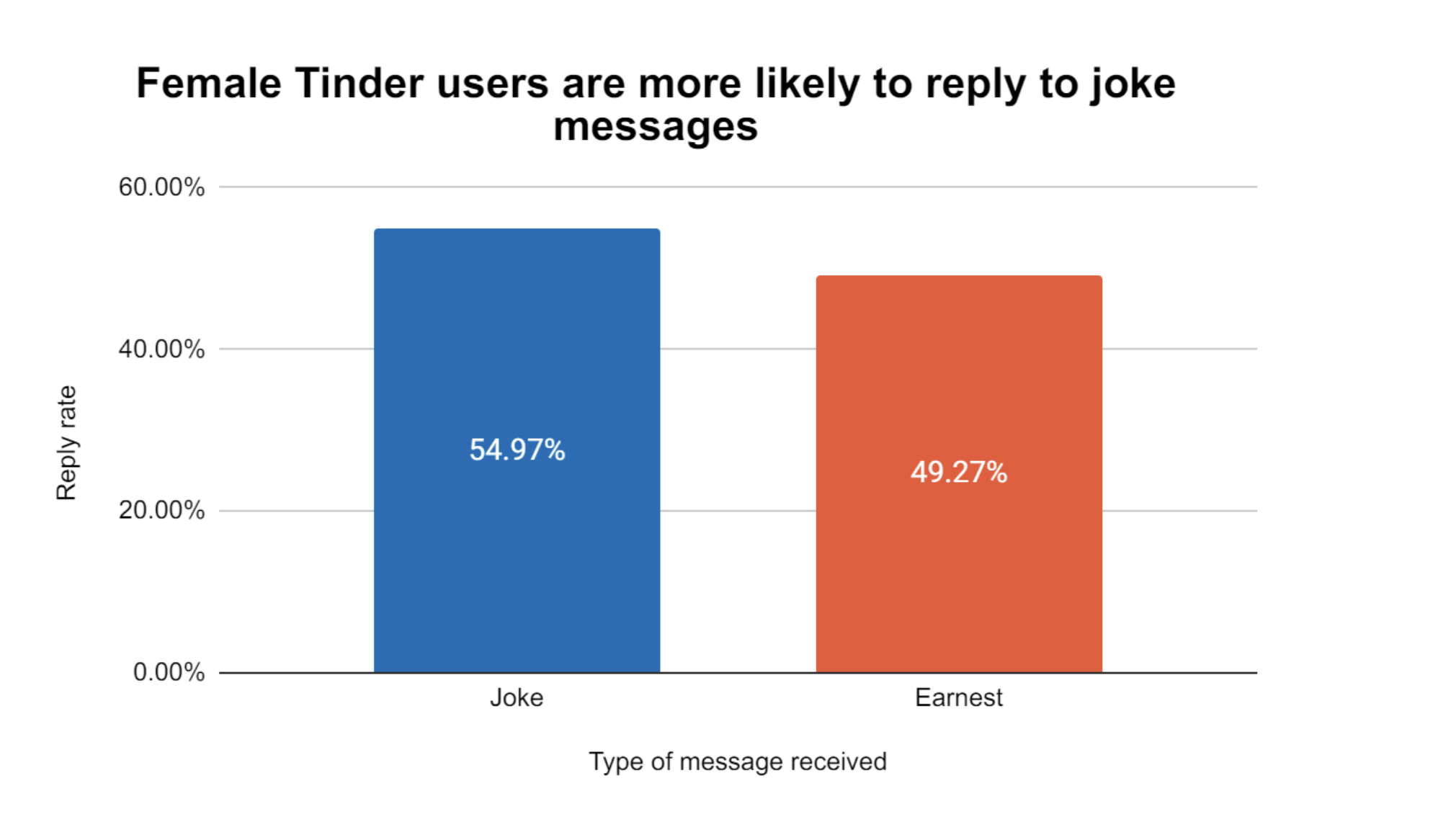The search for love is no laughing matter. But could a sense of humor be the key to helping single men find dates on Tinder?
Men may still have the upper hand societally in many ways, but online dating is not one of them. Women enjoy a 50% response rate to the initial messages they send, while men only hear back 21% of the time. It’s enough to make men in their twenties and thirties resort to dad jokes. But can humor really help them stand out?
We did some applied research to test the effectiveness of humor in men’s online dating app messaging—and the findings surprised us.

What Are the Barriers to Connection on Tinder?
While there is some data on which approaches to dating are most effective, there’s little experimental evidence on what messaging strategy improves your already slim chances of getting a message back. Previous studies have investigated the effectiveness of different messaging strategies.
One Tinder study showed that jokes made women more likely to want to date, but the combination of jokes with objectifying compliments about appearance backfired (think ‘Are you from Tennessee? Because you’re the only 10 I see.’). Surveys conducted by OkCupid indicate that users most like being asked questions. This makes sense, considering the effort needed to smalltalk with a stranger. But they left no clue as to which types of questions would work best.
What approach should you take? When does it pay to be sweet and genuine versus funny and weird? Both the operators and users of dating apps have an incentive to figure out how to get someone to reply to a carefully crafted introduction.
Even with strong intentions to find a match, however, the vast range of options for approaching a first message could lead to uncertainty. This can cause users to not respond at all, or worse, to reply with the first, unfiltered thought that comes to their minds.
Reducing uncertainty could do wonders for crafting better first messages, and, in the downstream, generating more dates, love, and relationships. So, what works for getting that special someone’s attention? What tried and true, simple approach can we take that will decrease our chances of rejection? Unfortunately, the answer is unclear. There just haven’t been evidence-based experiments in the dating app world that test response rates to different types of messages.
What Can We Do About It? Experiment!
As behavioral scientists, we’re obsessed with experimentation. And who can blame us? Designing experiments is a lot of fun—and also happens to be intellectually fulfilling. But most importantly, experimentation provides much-needed evidence of how humans actually behave in specific contexts.
If you haven’t noticed, we humans are notoriously unreliable. What we say about our beliefs and predict about our future actions often doesn’t align with what we do in reality. So experimentation ‘in the wild’ is key to understanding the levers that actually drive behavior change—especially when it comes to an area as subjective and unpredictable as dating.
The Experiment
Background
While both men and women self-report both an intention and desire to connect on dating apps, men are much less likely to receive a response to their initial messages. This indicates that the tone of the initial message may impact a woman’s sense for future interactions with the sender—and inform her decision about whether to take a chance on the match.
To learn more about the impact of messaging on response rates, we designed our experiment to investigate whether female Tinder users are more likely to respond to humorous versus earnest messages from men on the platform.
Approach
We’re no strangers to online dating and were confident that our experiment was well-suited to an online environment. Was it realistic for us to create an online dating profile using the photos and personal information of a particularly brave colleague? Yes. Was it feasible? Absolutely.
We conducted our experiment on Tinder, with our respondents being real Tinder users in 5 major US cities containing the highest concentration of Tinder users. This helped us avoid hypotheticality bias, where people make different decisions than they would in the real world, because we were conducting the experiment using the app.
We sent 1,227 messages to 1,227 unique users whom we matched with on Tinder, making our total sample size 1,227.
To ensure that the earnest and funny questions in the A/B test were within the range of what one would typically encounter on Tinder, we surveyed 213 straight women who had used Tinder in the last year in the markets we were targeting. In the survey, we assigned each participant to a list of 4 earnest or funny questions and asked them to rank how likely they would be to respond to each one. In the end, we chose the following 2 questions because they received the highest ratings for being earnest and funny, respectively:
- Earnest: Hey, what song have you been playing on repeat lately?
- Humorous: Hey, did we have class together? I could have sworn we had chemistry.
During the experiment, 5 behavioral scientists swiped ‘yes’ on as many profiles as they could during the 3-hour period of the day when users are most active in locations tested. Each scientist set their city location to one of the 5 cities we selected and used identical dating profiles. Half of the time, they randomly chose the earnest message, and half of the time they chose the humorous message.
Finally, we controlled for age by having everyone swipe only on the profiles of 25-year-old-to-45-year-old users. In addition, we controlled for any effects of proximity on response by limiting swiping to users within 10 miles of their reported location.

What Did We Learn?
We found that women were 12% more likely to reply to funny messages than earnest ones. That’s a statistically significant difference that clearly favors men who use humor in their communication with potential dating partners.

We’re not sure how far these findings can be extended past a first message initiated by a straight man to a straight woman on Tinder, but would love to hear results from readers with a different gender and/or sexual orientation who try a similar experiment in their personal lives.
The Punchline: Humor Helps
If you’re headed into Valentine’s Day thinking that love is strictly serious business, perhaps you should think again.
All is fair in love and war, but it may be fairer for the funny—at least among men who are battling for female attention on Tinder.
Need help solving challenges with your dating app, product, or service? Get in touch to learn more about our consulting services. Or learn more behavioral science by joining one of our bootcamps.
